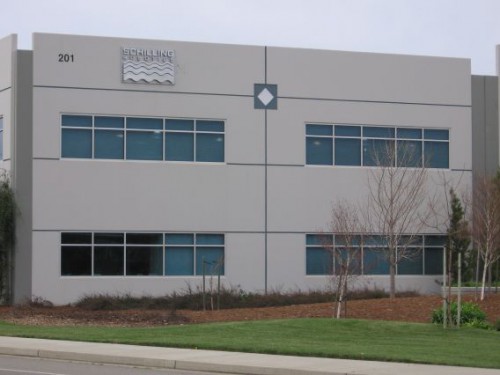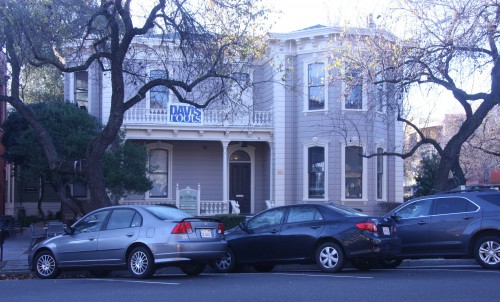
A piece written in the local paper this week got me thinking about the economic development landscape for Davis and the innovation parks. Wrapped in a nice article on Schilling Robotics was the political reality faced by the community and Davis City Council.
More than just the reality it is a dilemma. The lead paragraph however, stuck in my craw. It read, “Davis’ entire economic present and future can be symbolized by one local company: Schilling Robotics, LLC.”
The more I have thought about – the more I disagree with the comment and that is nothing against Schilling or a potential Mace Innovation Center that might be the future home of Schilling.
As I have argued previously, there were two critical moments that made this current economic development push for innovation parks possible in the Davis landscape. That is the discussion that arose twice over Mace 391 back in 2013. The other was the departure of Bayer-Agraquest, which like Schilling was a native born Davis company that needed space to leave.
The reality is this – we have many companies that are looking to grow and retain their presence in Davis. Schilling Robotics is but one example of that need. The community through a Measure R vote is ultimately going to have to weigh the risks and downsides of developing on the periphery against the need to preserve and retain these companies.
Tyler Schilling and Schilling Robotics is in fact betting on Davis. He is betting that Davis will over-come its well-earned reputation as being an unfriendly city to business. He is clearly willing to take more of a change to try to stay than other companies have in the past or would have.
In that sense, I think Schilling Robotics is less the symbol of Davis’ entire economic present and future, than one of many who will be testing to see which way the wind ultimately blows when they decide what to do.
At the same time, in the last six months, my view of the Davis economic present and future has been radically transformed.
The most conspicuous part of the economic development future will be the innovation parks. These are getting tremendous amount of attention. We are looking to potentially add 7 million square acres of potential space both at Mace and the Davis Innovation Center.
In addition, Nishi is moving forward as well and while it is a smaller property with a much smaller amount of innovation space, it is also a Measure R vote that will require the community’s support.
One of the big questions is timing. When this discussion came up a few weeks ago, he was concerned about the prospect of three projects being on the ballot at the same time and having “this massive, multi-project, free-for-all on the ballot.”
Mayor Pro Tem Robb Davis would add, “I think it’s problematic and I don’t think it honors the community process to do it that way.”
Councilmember Lucas Frerichs went a step further, saying, “It’s crazy actually. Not just problematic.”

While Mayor Dan Wolk was not ready to agendize a discussion on timing, in the latest article he acknowledged it was a critical issue that should not be left to the mark to decide. He told the paper, “I think it is incumbent on the City Council to lead in this area.”
But while the innovation parks and Nishi are important policy issues, the entire economic future does not rest with them.
We have been covering the startup movement in Davis. We have the ongoing efforts of Davis Roots, the newly emerging Jumpstart Davis, and now the worker space of Pollinate Davis. These are startups, they are small companies with few employees for now, but they are doing exciting and innovative things and some of these companies could relatively quickly become the next Schilling Robotics or Agraquest or any number of other native born Davis companies.
UC Davis is of course a driving force in research and tech transfer from university research to startup companies. While we have discussed some of the universities efforts behind the World Food Center, concerned that the city would miss out on a potential billion dollar plus World Food Center, the university figures to become a driving force in the region.
Chancellor Linda Katehi recently laid out her vision for the future of innovation writing, “Never before have universities held such great potential for making an impact locally, nationally and globally.”
She writes, “Universities of the 21st century will be defined by the impact they make, not only in educating our students but also in finding solutions to the world’s most pressing challenges. Which is why building robust, lasting collaborations among universities, government and industry is so important.”
“To cite just one potent example, thanks to partnerships between universities such as UC Davis, government and state agricultural producers, California has become a $45 billion-a year-industry and has been the largest agricultural producer in the nation for more than five decades. And the solutions we’ve developed here have spread across the country and the world, helping to feed and nourish countless millions,” the Chancellor continues.

“The recent partnership we announced between the World Food Center at UC Davis and Mars, Incorporated to create a new Innovation Institute for Food and Health on our campus is another promising collaboration,” she writes. “Universities, government and industry working together have great potential to accomplish much more than would be possible if they only worked alone. I look forward to even stronger collaborations in the future.”
Finally, we have the innovation coming from private industry. Nearly a month ago, Panattoni announced it planned to develop between 150,000 and 225,000 square feet of new Class A office, lab and technology space on a site the lies on Chiles Blvd along I-80. The site is said to be the largest undeveloped site within the City of Davis currently approved for development.
According to a press release, “The proposed state-of-the-art campus design will focus on sustainability, technological enhancements, and a strong sense of place both indoors and outdoors.”
In short, while the Innovation Park and the retention of Schilling Robotics is important, we have many other major endeavors that will help shape the economic present and future of Davis. First we have the Davis Innovation Center. Second we have Nishi. Third, we have the emerging startup culture through Davis Roots, JumpStart Davis and Pollinate Davis. Fourth we have the ongoing efforts of UC Davis. And fifth we have private efforts such as Panattoni. Finally, while we have not mentioned it much, there is also the proposed Hotel Conference Center on Richards at the current site of the University Park Inn and Caffe Italia that figures to bring in large amounts of tax dollars to the city.
These changes mark a sea change from what was happening even two years ago when the city started to change its direction and brought in Chief Innovation Officer Rob White whose efforts have been instrumental at bringing the public along to both the needs and possibilities.
A lot of this new leadership is coming not only from City Hall but also from elements of the community. The big question of course is will the general public embrace these opportunities. That remains to be seen.
—David M. Greenwald reporting






“More than just the reality it is a dilemma. The lead paragraph however, stuck in my craw. It read, “Davis’ entire economic present and future can be symbolized by one local company: Schilling Robotics, LLC.””
Schilling does SYMBOLIZE Davis’s entire economic present and future. It is a tech company. It needs space to grow. It is willing to work with Davis to find a way for it to stay in Davis. It brings in much needed tax revenue. It brings high paying jobs to the community. The statement cited did not say “Davis’ entire economic present and future DEPENDS on one local company: Schilling Robotics, LLC.” There is a difference in these two statements! I did not read SYMBOLIZE to mean DEPENDS!
“But while the innovation parks and Nishi are important policy issues, the entire economic future does not rest with them.”
We have been covering the startup movement in Davis. We have the ongoing efforts of Davis Roots, the newly emerging Jumpstart Davis, and now the worker space of Pollinate Davis. These are startups, they are small companies with few employees for now, but they are doing exciting and innovative things and some of these companies could relatively quickly become the next Schilling Robotics or Agraquest or any number of other native born Davis companies.”
Yes, pretty much the economic future of Davis does rest with the innovation parks. Why? Because while Jumpstart, Davis Roots, Pollinate Davis, etc. are wonderful in regard to the innovation picture, the following must be kept in mind: 1) a startup company is going to need space to grow, or it will not bother to “start up” here in Davis – we have already seen this play out by companies leaving town for lack of space to grow; 2) the city needs massive tax revenue to work its way out of its financial hole, and I very much doubt anything but the large innovation parks will do that.
I do not minimize the other efforts of Jumpstart, Davis Roots, Pollinate Davis, etc. which are important components of the entire innovation program. In sum, the innovation parks are necessary to show tech businesses if they locate here there will be space to expand, which is essential to drawing innovation to our town rather than have them go elsewhere where there is more space; and Jumpstart, Davis Roots, Pollinate Davis create a welcoming and collaborative atmosphere to make it inviting for innovative companies to come.
That said, do we really need to pit one aspect of getting innovation parks here in Davis against others, and create controversy? The more we do whatever will bring tech companies here in the aggregate, an “innovative integration plan” if you will, the better the chances they will decide to come.
“That said, do we really need to pit one aspect of getting innovation parks here in Davis against others, and create controversy? The more we do whatever will bring tech companies here in the aggregate, an “innovative integration plan” if you will, the better the chances they will decide to come.”
i don’t see this piece as pitting anything against another. in fact the contrary. the vanguard laid this out as all being necessary pieces to the puzzle.
i agree with the vanguard, the idea that schilling embodies the entire present and future is ludicrous.
City leadership appears to be both more progressive with respect to economic development, while also being more reactive to the most vocal for every policy and potential policy issue. So to help city leadership stay the course in economic development, elements of the community in support of it need to be more vocal than are the elements in opposition.
Well-said Anon. I think this hand-wringing over the timing is just that. We are talking about a 20-year-plus build out for the larger parks (not sure about Nishi). And let’s not forget some of the core drivers for the innovation parks… a sustainable Davis city budget being at the top of the list. I would rather we take a holistic and comprehensive view of Davis 20-years from now instead of nitpicking winners and losers to satiate the nervous tendencies of some.
If we don’t do this, I absolutely believe that 20 years from now we will look back to understand our indecisiveness as responsible for copious lost opportunity to control our own destiny to remain a great little city… and lost opportunity to be continually recognized as being worthy of recognition for our self-imposed “progressive” label.
again, i don’t see anyone pitting one against the other, i see the effort to work the entire ecosystem.
I’m going to go with a “gut” prediction… Nishi will get approved, along with one or more of the other innovation center. Nishi will build the residential component first, then after the other “centers” are approved/come “on-line” the Nishi owners will claim “hardship” and be back before the CC (and, maybe, voters) to go much higher residential. Not saying that’s good or bad, but am thinking residential makes sense @ Nishi, but not the outlying proposals. Just an opinion.
maybe but it sounds like uc davis may end up slowing down the process.
Interesting prediction. Certainly possible. Not sure I necessarily agree w the prediction. I think a lot depends on what UCD truly wants in that space.
Interesting comment. If it depends on what UC wants, they should take total responsibility for it. Utilities, roadways, other financial responsibility. And, NO motor vehicular access to West Olive. Also, no voting rights in city elections. I could definitely live with that outcome.
I’m not following you here. Isn’t that city property that Nishi will be built on? Isn’t the city asking for UCD input, because this property is so close to campus, and because this is a partnership between the city and UCD to encourage incubator labs and the like for research for startups, which will emanate mostly from UCD? Doesn’t the city want to support this type of development?
Anon, the last time I checked the Nishi property was privately owned rather than city property (i.e. not owned by the city). Further, that privately-owned land is currently in the unincorporated portion of Yolo County, outside the City Limits of Davis.
In order to move the property from County jurisdiction to City jurisdiction, the City and the County will need to agree to the terms of a transfer (i.e. annexation by the City) and Yolo LAFCO will need to approve that annexation.
it isn’t a prediction. uc davis got scared when students started protesting against tearing down solano park. now they hold the key to nishi in their hands. without university access, there aren’t three votes on council to push it through. ucd is holding up that process now under the guise of planning. it will be interesting to watch how it plays out.
DP, given that the proposed access under the UP tracks is outside the boundaries of the Solano Park Graduate Student Housing Complex, I believe the student demonstrations against the razing of Solano Park really don’t affect the access to and from the University and Nishi through to planned underpass.
Matt Williams: “Anon, the last time I checked the Nishi property was privately owned rather than city property (i.e. not owned by the city). Further, that privately-owned land is currently in the unincorporated portion of Yolo County, outside the City Limits of Davis.
In order to move the property from County jurisdiction to City jurisdiction, the City and the County will need to agree to the terms of a transfer (i.e. annexation by the City) and Yolo LAFCO will need to approve that annexation.”
You are absolutely right, I had totally forgotten about that. Put the cart before the horse, so to speak!
DP: “it isn’t a prediction. uc davis got scared when students started protesting against tearing down solano park. now they hold the key to nishi in their hands. without university access, there aren’t three votes on council to push it through. ucd is holding up that process now under the guise of planning. it will be interesting to watch how it plays out.”
How and why is UCD “holding up” the process, and how do you know this?